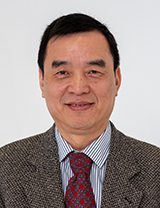UCONN HEALTH
Neuroscience Department
Exploring Minds, Illuminating Futures
Neurobiology of Disease Research
Basic Neuroscience Research
Welcome From The Chair
Riqiang Yan, PhD

The Department of Neuroscience has a rich history of research excellence since it had been formally established by Dr. Richard Mains in the year 2000. Currently, we have 26 faculty members, who are actively funded their research from various sources including the federal grants and philanthropic support. Our faculty and their laboratories utilize an interdisciplinary approach to research with the goal of understanding the normal function and disorders of the nervous system that may hold the key to developing novel therapies. We nurture an exceptionally collegial academic environment with high level of interaction and collaboration among laboratories in the Department and with other laboratories at UConn Health Center and at the UConn Storrs campus, all of which make the Department of Neuroscience a vibrant and dynamic place to do science.
Program Resources
Helpful contacts and series of milestones as you progress toward obtaining a Doctor of Philosophy degree from UConn Health.
ExplorePhD in Biomedical Science
Our graduate students receive comprehensive interdisciplinary training in all areas of neuroscience and perform translational research at the highest level.
ExploreStudy Abroad Program
Held in Salamanca, Spain, this course is for graduate students in Neuroscience and Hearing Research and upper-level undergraduate students.
ExploreDepartment and Program News
- Renowned Stem Cell Expert Lecturing about MS repairDr. Stefano Pluchino, the pioneer of the field of regenerative neuroimmunology and professor from the Department of Clinical Neurosciences at the University of Cambridge in the U.K., is the keynote speaker for the inaugural Petit Family Lecture and Visiting Professorship in Multiple Sclerosis and Immunology at UConn Health. The program is free, with registration required. […]Posted on June 3, 2025
- Dr. Imitola: First Stem Cell Medicine Course Available for FreeUConn School of Medicine Neuroscience Expertise and Leadership Contributes to International Society for Stem Cell Research (ISSCR) and Harvard Medical School’s First Global Continuing Education Course for Clinicians and Medical Students. Dr. Jaime Imitola, co-led and is a co-creator of this major educational development for health care providers. Stem Cell Medicine: From Scientific Research […]Posted on May 29, 2025
- Peter Brown wins the 2025 ARVO MIT Outstanding Poster AwardPeter Brown, a second-year medical student at the University of Connecticut School of Medicine, was recently awarded the Members-in-Training (MIT) Outstanding Poster Award at the 2025 Association for Research in Vision and Ophthalmology (ARVO) conference. Among more than 11,000 scientists, Peter shared his recent efforts in the neuroscience vision lab of Drs. Royce Mohan and […]Posted on May 12, 2025
- Dr. Yulan Xiong Faculty Spotlight 2025Spring 2025 awardee: Yulan Xiong Ph.D. Yulan Xiong, Ph.D., associate professor of neuroscience, is honored for her notable impact in the field of Parkinson’s disease research. This impressive work has contributed to discoveries which are advancing understanding of the disease and leading to new potential treatments. She was nominated by Dr. Riqiang Yan. […]Posted on May 12, 2025
